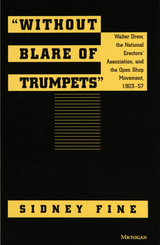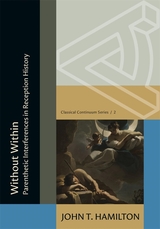
The performance of the British economy in the critical decades before 1914 is the subject of much scholarly debate. This first modern history of the British shipbuilding industry between 1870 and 1914 examines activities and attitudes of the shipbuilders in the context of this controversy over the quality of British entrepreneurship.
The authors consider the effectiveness of marketing practices, the rate of technological change, the degree to which ever-scarcer natural resources impose a constraint on growth, the general economic rationality of entrepreneurs, and, above all, the consequences of management decisions. After carefully weighing all evidence, the authors conclude that the general level of managerial performance was high, and in contrast to other sectors of heavy industry, British shipbuilders were able to maintain their dominant position.
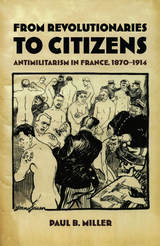
Although more general accounts of the Left’s “failure” to halt international war in August 1914 focus on its lack of unity or the decline of trade unionism, Miller contends that these explanations barely scratch the surface when it comes to interpreting the Left’s overwhelming acceptance of the war. By embedding his cultural analysis of antimilitarist propaganda into the larger political and diplomatic history of prewar Europe, he reveals the Left’s seemingly sudden transformation “from revolutionaries to citizens” as less a failure of resolve than a confession of commonality with the broader ideals of republican France. Examining sources ranging from police files and court records to German and British foreign office memos, Miller emphasizes the success of antimilitarism as a rallying cry against social and political inequities on behalf of ordinary citizens. Despite their keen awareness of the bloodletting that awaited Europe, he claims, antimilitarists ultimately accepted the war with Germany for the same reason they had pursued their own struggle within France: to address injustices and defend the rights of citizens in a democratic society.
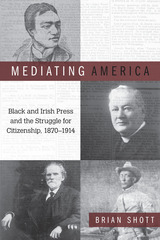
Until recently, print media was the dominant force in American culture. The power of the paper was especially true in minority communities. African Americans and European immigrants vigorously embraced the print newsweekly as a forum to move public opinion, cohere group identity, and establish American belonging.
Mediating America explores the life and work of T. Thomas Fortune and J. Samuel Stemons as well as Rev. Peter C. Yorke and Patrick Ford—respectively two African American and two Irish American editor/activists in the late nineteenth and early twentieth centuries. Historian Brian Shott shows how each of these “race men” (the parlance of the time) understood and advocated for his group’s interests through their newspapers. Yet the author also explains how the newspaper medium itself—through illustrations, cartoons, and photographs; advertisements and page layout; and more—could constrain editors’ efforts to guide debates over race, religion, and citizenship during a tumultuous time of social unrest and imperial expansion.
Black and Irish journalists used newspapers to recover and reinvigorate racial identities. As Shott proves, minority print culture was a powerful force in defining American nationhood.

William Wray presents an in-depth examination of the origins and institutional growth prior to World War I of Mitsubishi, today Japan's largest industrial group, and the Nippon Yusan Kaisha (N.Y.K.), now the world's leading shipping enterprise. Drawing heavily upon previously inaccessible archival material from Japanese and Western companies, Wray shows how Japanese business grew out of institutional change through conflict. Three major themes illustrate tension and conflict: the struggle by managers to retain company autonomy, the role of the government in planning and intervening in the economy, and internal company disputes between managers and stockholders over financial issues.
This study, however, is much more than the history of two companies. It provides extensive analysis of decisionmaking in the Meiji government, the finances of the Imperial House, trading strategies, international commercial diplomacy, imperialism, and the shipping industry's response to war.

Surveying these and other international developments in the Pacific basin during the three decades preceding World War I, Kees van Dijk traces the emergence of superpowers during the colonial race and analyzes their conduct as they struggled for territory. Extensive in scope, Pacific Strife is a fascinating look at a volatile moment in history.
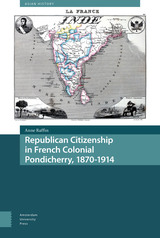
The difficulties of implementing a new political culture based on the language of rights and participatory political institutions were not so much rooted in a lack of assimilation into the French culture on the part of the Indian population. Rather, they were the result of political infighting and long-term conflicts over status, both in relation to caste and class, and between inclusive and exclusive visions of French citizenship.
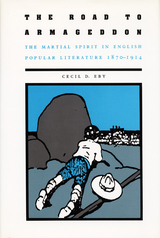
In The Road to Armageddon Cecil Eby shows how the widely admired writers of English popular fiction and poetry contributed, at least in England, to a romantic militarism coupled with xenophobia that helped create the climate that made World War I seem almost inevitable.
Between the close of the Franco-Prussian War of 1871 and the opening guns of 1914, the works of such widely read and admired writers as H. G. Wells, Rudyard Kipling, J. M. Barrie, and Rupert Brooke, as well as a host of now almost forgotten contemporaries, bombarded their avid readers with strident warnings of imminent invasions and prophecies of the collapse of civilization under barbarian onslaught and internal moral collapse.
Eby seems these narratives as growing from and in turn fueling a collective neurosis in which dread of coming war coexisted with an almost loving infatuation with it. The author presents a vivid panorama of a militant mileau in which warfare on a scale hitherto unimaginable was largely coaxed into being by works of literary imagination. The role of covert propaganda, concealed in seemingly harmless literary texts, is memorably illustrated.
READERS
Browse our collection.
PUBLISHERS
See BiblioVault's publisher services.
STUDENT SERVICES
Files for college accessibility offices.
UChicago Accessibility Resources
home | accessibility | search | about | contact us
BiblioVault ® 2001 - 2025
The University of Chicago Press





